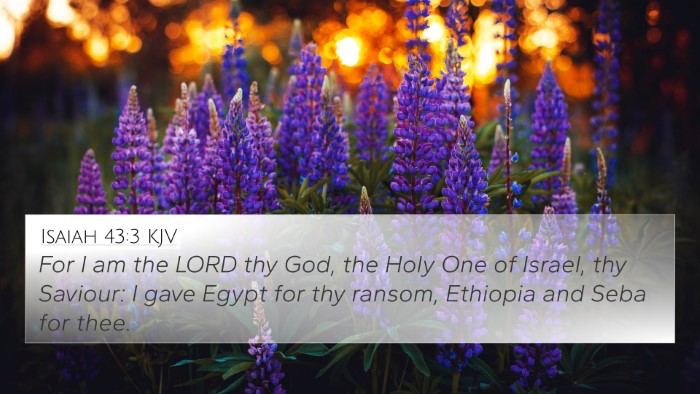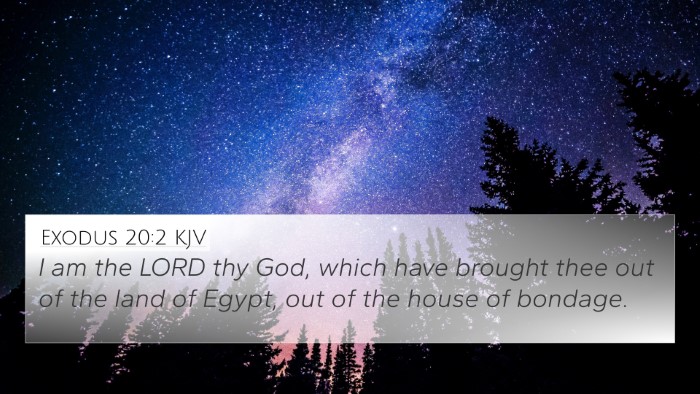Exploration of Leviticus 25:55
Verse: "For unto me the children of Israel are servants; they are my servants whom I brought forth out of the land of Egypt: I am the LORD your God."
Summary of Meaning
Leviticus 25:55 encapsulates the foundational principle of God's relationship with Israel, emphasizing the covenantal servitude that the Israelites owe to God as their redeemer. The verse makes a poignant declaration about the status of the Israelites as God's chosen people, established by His powerful act of deliverance from slavery in Egypt.
Commentary Insights
-
Matthew Henry:
Henry highlights this verse as a reminder that God has a special claim over the Israelites. He notes that their servitude is not merely a conceptual framework but a lived reality that stems from their deliverance and transformation. They are to serve God, who has liberated them, reinforcing their identity as His devoted people.
-
Albert Barnes:
Barnes focuses on the implications of being God's servants, arguing that this servitude involves duty and lifestyle changes reflecting their identity. He notes that just as they were freed from Egyptian bondage, they must now embrace the divine law and be obedient to Him as an expression of gratitude for salvation.
-
Adam Clarke:
Clarke interprets the verse as a clarion call to acknowledge God's sovereignty. He reinforces the idea of Israel's unique role in God's redemptive plan and links their servitude to a broader theological context, implying that true freedom is found in submission to God's will.
Cross-References
This verse is richly connected to numerous others in the Bible that elaborate on its themes. Here are several key references:
- Exodus 3:10: God's commission to Moses to lead His people out of Egypt.
- Exodus 6:6-7: The promise of deliverance and the establishment of the covenant relationship with Israel.
- Deuteronomy 10:15: God's set-apart love for Israel among all nations.
- Isaiah 43:1: God's declaration of Israel as His creation, emphasizing His ownership.
- Galatians 4:7: Believers' status as children of God, linking the New Testament to the Old Testament covenantal themes.
- Romans 6:16: Body of believers' service either to righteousness or sin; contrasts Israel's servitude to God.
- 1 Peter 2:9: The church's identity as a holy nation, reflecting the theme of chosen people.
Thematic Connections & Interpretative Insights
This verse serves as a critical link in understanding the overarching narrative of the Israelite experience, which is marked by God's abiding faithfulness despite human waywardness. Through this lens, various thematic connections can be identified:
- Deliverance: The significance of liberation from Egypt serves as a metaphor for spiritual freedom across Scripture.
- Covenant Relationship: The enduring theme of covenant establishes the framework through which God interacts with His people.
- Servitude and Sovereignty: The balance between service to God and personal freedom embodies a dynamic relationship between the Divine and humanity.
Conclusion
Leviticus 25:55 not only provides insight into Israel's identity and relationship with God but also establishes a profound spiritual principle applicable to believers today. The inter-biblical dialogue created through cross-referencing and thematic exploration encourages a deeper understanding of God’s redemptive work throughout Scripture.
Further Study Tools
For those seeking to dive deeper into the study of cross-references in the Bible, consider utilizing tools such as:
- Bible Concordance for word-specific searches.
- Bible Cross-Reference Guide for thematic connections.
- Cross-Reference Bible Study methodologies to engage with the text.
- Bible Reference Resources, including chain reference systems that explore connections between verses.
Related Topics for Deeper Understanding
- Identifying Connections: Explore identifying connections between the Old and New Testament.
- Detailed Cross-Reference: Study the comparative references across the Gospels.
- Understanding Themes: Investigating cross-referenced themes enhances comprehension of Biblical messages.















